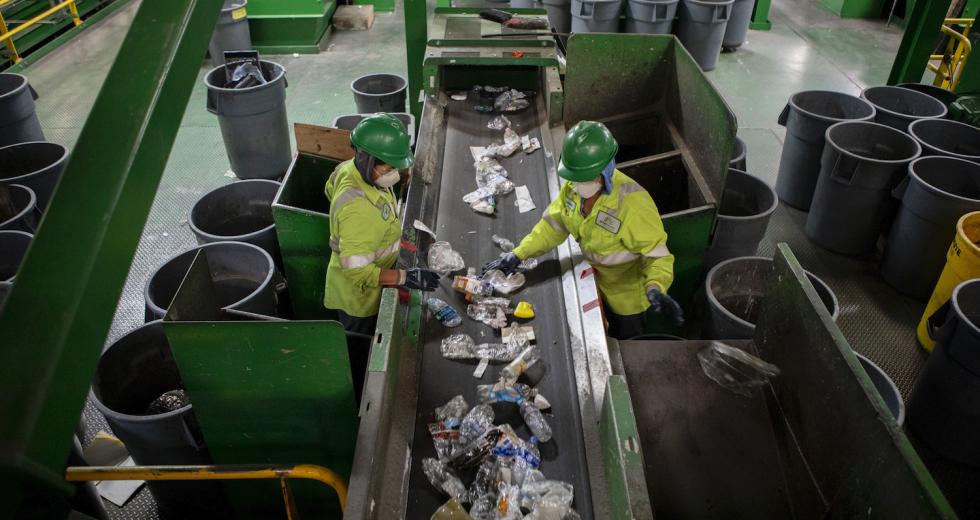An ambitious push to make California the first state to stem the flow of plastic trash by phasing out single-use packaging and foodware failed early Saturday amid dogged industry opposition, as state lawmakers adjourned without acting on two far-reaching recycling bills.
However a third measure calling for more recycled plastic in beverage bottles did manage to get to a vote, and pass — one for three in a complex but urgent fight to address California’s recycling woes.
The mixed result represented one step forward, two steps back for the lawmakers who aimed to tackle California’s waste crisis as fragments of plastic drift through the depths of Monterey Bay and recycling centers close across the state.
The Legislature sent Gov. Gavin Newsom a bill requiring manufacturers to increase the amount of recycled plastic in beverage bottles to 50 percent over the next ten years. But they never voted on two other bills that called for a 75 percent reduction in waste from disposable packaging and foodware like forks, stirrers and cups. The lawmakers could revive the bills in January — but for now, the state will have to wait.
Julia Stein, supervising attorney at UCLA’s Frank G. Wells Environmental Law Clinic called it “a missed opportunity for California to take a leadership role in regulating plastic producers.”
Kathryn Phillips, director of Sierra Club California, saw less of a setback. “It’s always disappointing when things don’t go the ideal way,” she said. “But I actually think this is not a defeat, it’s just a delay.”
The decisions came as California’s recyclers are struggling to cope with markets in turmoil after China’s 2017 announcement that it would tighten contamination standards and ban imports of certain types of waste. California once exported about a third of its recycling, much of it to China, according to estimates from CalRecycle, California’s Department of Resources Recycling and Recovery.
Now, California’s recyclers are stockpiling or landfilling bales of plastic films, clamshell-style containers and even paper that they struggle to sell. rePlanet, a major collector of beverage containers, shuttered its 284 centers in California despite receiving $25 million from the state.
“We really have a crisis on our hands here,” said Sen. Ben Allen, the Santa Monica Democrat who, with Democratic Assemblywoman Lorena Gonzalez of San Diego, authored the two bills that didn’t receive a vote as the legislative year ended. The pair had wanted “to strike while the iron’s hot.”
Only Assemblymember Phil Ting, a Democrat from San Francisco, was able to. During legislative proceedings, Ting called his bill “the most aggressive recycling program regarding recycled plastic in bottles in the country.”
Still, the bill was more aggressive earlier on. It initially required that manufacturers make beverage bottles with 100 percent recycled plastic by 2035, but that was dialed back to an average of 50 percent by 2030. And where the measure once outlined fines calculated per bottle, now they’re calculated by weight — which cuts the cost of breaking the rules.
Major opponent Nestle Waters North America dropped its opposition and now supports the bill. The American Beverage Association, a heavy hitter, shifted from oppose to neutral. And Californians Against Waste supports the bill, although executive director Mark Murray was disappointed by the changes.
“The penalty is lower than the cost of recycling. So for the beverage industry that’s falling short, it’d be cheaper for them to pay the penalty than it would be to comply,” Murray said.
Ting said the new penalties are a compromise that still reduces plastic waste. “There were concerns that the penalties in the previous version … were too punitive — with some companies paying more than $12 million,” the lawmaker said in an emailed statement.
As for Allen and Gonzalez, their bills are on ice, for now. Their two bills, collectively called the California Circular Economy and Pollution Reduction Act, would have set a statewide goal of cutting three quarters of the waste from disposable packaging and products like straws and stirrers by Jan. 1, 2030. That would also have been the deadline for manufacturers to start making such goods out of completely recyclable or compostable materials.
The Act faced early opposition by the plastics and beverage industries who argued the bills were too punitive and that California should fix its recycling infrastructure before taking aim at manufacturers. Objections from many plastics and beverage businesses ultimately fell away, however. Major trade groups, including the American Chemistry Council and the American Beverage Association, shifted their positions to neutral. Plastic company Dow Inc. signed on in support, as did the California Grocers Association.
Still, the measures also picked up opposition. The Glass Packaging Institute, for instance, objected to having 100 percent recyclable glass lumped in with the rest of the packaging the legislation covered. And Gary Clifford, executive vice president of the waste collection and recycling company Athens Services thought the latest version went too far in stemming the waste stream.
“We were doing something with some of that waste,” he said. “We just thought it was a little overreaching right now.” Clifford didn’t want the bill to die, he said; he just wanted more time to change it.
Now, he may have that time. Sierra Club’s Phillips acknowledged that the push was a longshot. “They got a long way this session, but they were pretty ambitious bills,” she said.
Sen. Allen said negotiations will continue. “We make a few changes and we make it happen in the new year.”
—
CalMatters.org is a nonprofit, nonpartisan media venture explaining California policies and politics. Comstock’s is a CalMatters media partner.
This article originally appeared on CalMatters.org under the headline, “California lawmakers stall on landmark legislation to curb plastic trash”



